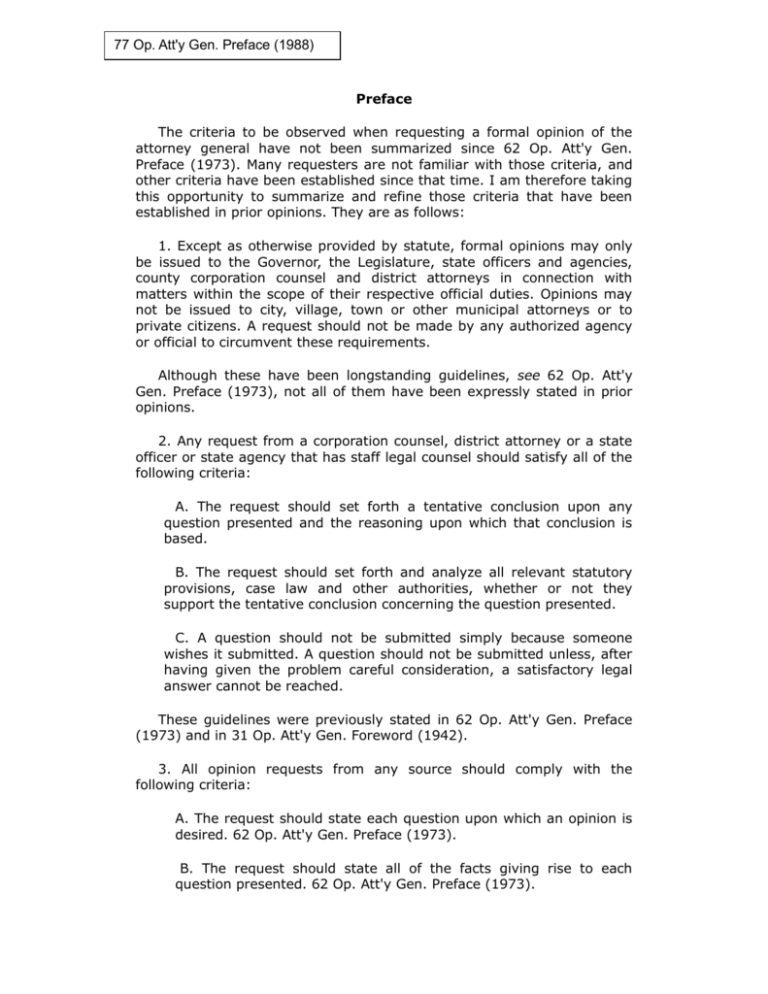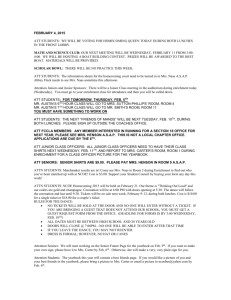77 Op. Att`y Gen. Preface (1988) (1988) Preface The criteria to be
advertisement

77 Op. Att'y Gen. Preface (1988) (1988) Preface The criteria to be observed when requesting a formal opinion of the attorney general have not been summarized since 62 Op. Att'y Gen. Preface (1973). Many requesters are not familiar with those criteria, and other criteria have been established since that time. I am therefore taking this opportunity to summarize and refine those criteria that have been established in prior opinions. They are as follows: 1. Except as otherwise provided by statute, formal opinions may only be issued to the Governor, the Legislature, state officers and agencies, county corporation counsel and district attorneys in connection with matters within the scope of their respective official duties. Opinions may not be issued to city, village, town or other municipal attorneys or to private citizens. A request should not be made by any authorized agency or official to circumvent these requirements. Although these have been longstanding guidelines, see 62 Op. Att'y Gen. Preface (1973), not all of them have been expressly stated in prior opinions. 2. Any request from a corporation counsel, district attorney or a state officer or state agency that has staff legal counsel should satisfy all of the following criteria: A. The request should set forth a tentative conclusion upon any question presented and the reasoning upon which that conclusion is based. B. The request should set forth and analyze all relevant statutory provisions, case law and other authorities, whether or not they support the tentative conclusion concerning the question presented. C. A question should not be submitted simply because someone wishes it submitted. A question should not be submitted unless, after having given the problem careful consideration, a satisfactory legal answer cannot be reached. These guidelines were previously stated in 62 Op. Att'y Gen. Preface (1973) and in 31 Op. Att'y Gen. Foreword (1942). 3. All opinion requests from any source should comply with the following criteria: A. The request should state each question upon which an opinion is desired. 62 Op. Att'y Gen. Preface (1973). B. The request should state all of the facts giving rise to each question presented. 62 Op. Att'y Gen. Preface (1973). C. Any request requiring the resolution of questions of fact should not be submitted, since the attorney general has no authority to decide questions of fact. 77 Op. Att'y Gen. 36 (1988); 68 Op. Att'y Gen. 416 (1979); 40 Op. Att'y Gen. 3 (1951). D. An opinion should not be requested on an issue that is the subject of current or reasonably imminent litigation, since an opinion of the attorney general might affect such litigation. 62 Op. Att'y Gen. Preface (1973). E. Opinions on matters involving the exercise of legislative or executive judgment or the exercise of discretion by public officers should not be requested. 77 Op. Att'y Gen. 36 (1988); 62 Op. Att'y Gen. Preface (1973); 40 Op. Att'y Gen. 3 (1951). F. Normally, opinion requests from the Legislature should be approved by the Senate Organization Committee or the Assembly Organization Committee. They should be limited to the validity or application of state statutes or to matters which are or will be pending before the Legislature, and should not be used as a vehicle to obtain legal advice for individual constituents or constituent governmental agencies. See OAG 58-88 (unpublished) (October 12, 1988). G. Except in extraordinary circumstances, the attorney general will not issue opinions concerning the applicability of federal statutes and regulations administered exclusively by federal authorities. See 77 Op. Att'y Gen. 287 (1988). H. Except in extraordinary circumstances, the attorney general will not issue opinions concerning the meaning or intent of municipal ordinances. See 77 Op. Att'y Gen. 120 (1988). 4. Although all of the foregoing criteria are subject to exception where the circumstances warrant, see 62 Op. Att'y Gen. Preface (1973), an opinion request which does not comply with these criteria may be returned to the requester with instructions to resubmit the request in an appropriate form.









